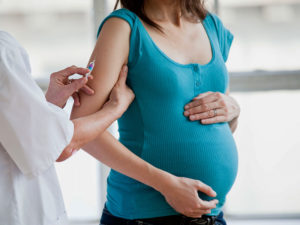 This article will discuss living with HIV (Human Immunodeficiency Virus) and are currently pregnant, or planning on becoming pregnant. This article also hopes to help you, if you are the partner to the HIV sufferer, friends or close relatives, to more or less, provide information to those who are really in need.
This article will discuss living with HIV (Human Immunodeficiency Virus) and are currently pregnant, or planning on becoming pregnant. This article also hopes to help you, if you are the partner to the HIV sufferer, friends or close relatives, to more or less, provide information to those who are really in need.
What is HIV and how does it affect my baby?
HIV is a type of retrovirus which impedes the immune system from functioning properly to fight off infections. If you have this virus in your body, you are categorized as a HIV sufferer (HIV positive).
This virus is transmitted to other people via transfer or the mixing of human bodily fluids such as blood, semen, vaginal mucus and breast milk.
This virus is also transmitted to your baby via the placenta and umbilical cord during the pregnancy process, or transmitted during the breastfeeding process. Care provided during pregnancy and after birth aims to reduce the risk of HIV transmission to your baby.
All pregnant women will be examined to detect HIV at the early pregnancy stage.
Extra care for pregnant women with HIV
Intensive care for those needing follow-up treatment will be provided by doctors which involves:
- Doctors who have expertise in HIV and infectious diseases (Infectious Disease Physician)
- Obstetricians & Gynaecologists
- Paediatrician
You and your baby will be monitored from time to time during pregnancy. The scope of treatment includes an antenatal ultrasound scan, viral load in the body and antibody to HIV (CD4). The level of drug in the blood will also be examined and monitored if you are under treatment for HIV.
Infection and Immunization

Picture source: Medscape
If you are a HIV sufferer, it is very important for you to know the immune level to certain infections. Like most pregnant women, your immune level towards Hepatitis B, Rubella (German Measles) and syphilis will be examined. You will be given the option to be examined on the status of Hepatitis C, Chickenpox (varicella zoster), Measles and Toxoplasmosis.
All pregnant women will be given immunization to fight against Pertussis. You will be advised to accept immunization towards Hepatitis B, if you have yet to receive the vaccine. The aforementioned vaccine is safe to be given during pregnancy.
However, the vaccine for Chickenpox, Measles, Mumps and Rubella (MMR) is not suitable to be given during pregnancy and will be delayed till you give birth.
A screening test to detect infection in the vagina (Vaginal swab) will be done at the early stages of pregnancy and will be repeated at week 28. If the results of the screening test indicates an infection, antibiotic treatment will be administered to reduce the risk of HIV transfer to your baby.
Diabetes during pregnancy
If you are undergoing medication for HIV during early pregnancy, you are advised to undergo a Glucose Tolerance Test between week 24 to week 28. Further information on pregnancy and diabetes, as well as the cause and effect can be referred from my previous article, which discusses in greater detail on diabetes during pregnancy.
How to reduce the risk of transmitting HIV to the baby?
The risk of transmitting HIV can be reduced dramatically in several ways as described below:
- HIV treatment is started with anti-retroviral medication
- Choosing to not feed the baby with the breast milk from HIV sufferers, or to exclusively feed the baby with formula milk (formula feeding).
- Birth via caesarean section if approved or recommended by obstetricians and medical experts.
Is anti-retroviral treatment safe during pregnancy?
Anti-retroviral medication is, of course, safe and suitable to be taken during pregnancy. Sometimes there will be 3 or more medications which will be prescribed together is termed as Highly active anti-retroviral therapy (HAART). These drugs are for reducing the risk of HIV transmission from mother to baby during pregnancy.
Although HAART is safe to be consumed during pregnancy, sometimes these drugs could result in side effects to the liver. Therefore, if HAART medication has already started, blood test monitoring must be done to ensure that the liver function is in good condition. Iron levels in the blood could be reduced and result in anemia, so you will be advised to consume supplements which are rich in iron.
HAART treatment is not harmful to the fetus. In fact, if you don’t consume the HAART medication, the risk of HIV transmission to your baby will be very high.
What is the best way to give birth to my baby?
Physicians and obstetricians will discuss with you on the best way to give birth to your baby. The discussion will include the virus level in the blood (viral load) and the level of CD4 antibody at the 36thweek of pregnancy and the history of previous births will be taken into consideration.
You will have the opportunity for normal birth, although you have given birth via caesarean section, under the condition that you are still under HAART treatment and have virus levels in the blood which is less than 50 and CD4 antibody levels above 350.
If you are under HAART treatment and the virus level in the blood is between 50 to 300, physicians and obstetricians will advise that you give birth via caesarean, typically at 38 weeks of pregnancy. However, this depends on the pattern of virus levels in the blood, the period of HAART treatment and taking into consideration your preferences.
Birth via caesarean is advised to be at 38 weeks of pregnancy if
- You are undergoing HAART treatment and have virus levels of 400 or more in the blood
- You are taking only Zidovudine medication
- You have Hepatitis C at the same time
Although you have been advised to have a caesarean birth, but if you wish to have a normal birth, your preference will be respected and honored by the doctors. However, if there are conditions which will be detrimental to the mother and baby during birth, you will undergo an emergency caesarean as advised by the obstetrician.
Regardless whichever way you choose to deliver your baby, your blood sample will be obtained during birth to determine the virus level in your blood.
What will happen if I were to give birth via Caesarean?
You will have to continue with the HAART treatment if already started, as advised by the doctor.
You will be prescribed medication by the name of Zidovudine via the blood vessels (intravenous), a few hours prior to caesarean and will continue till the baby is born and the umbilical cord is cut.
Because your delivery is highly likely planned before 39 weeks of pregnancy, you will be given steroids which will be injected in the muscles (intramuscularly) within 48 hours to reduce the risk of respiratory problems in the baby after birth.
If you already experiencing labour pains, prior to the date of caesarean section, you need to go to the hospital immediately. Emergency caesarean section will be conducted as soon as possible. Sometimes, the birth opening is too big and after examination by your obstetrician, you may have a normal birth.
What will happen if I am advised to have a normal birth?
HAART treatment needs to continue during the delivery process. Zidovudine is administered intravenously if the water is broke or you have a very high level of virus in the blood (viral load).
If you have gone beyond the expected delivery date and the virus level in the blood is very low, you will have the choice of induction of labour.
How will my baby be treated after delivery?
Your baby will be given anti-retroviral treatment within 4 hours after birth and will continue till he is between 4-6 weeks old.
Your baby will undergo tests to determine whether he has HIV on the second day of birth, on check-out day from the hospital, at 6 weeks old and at 12 weeks old. If all these tests are negative and you do not feed your baby with breast milk, then your doctor will safely conclude that your baby is free from HIV infection. However, further tests will be conducted when your baby is 18 months old.
What are the precautions I need to take if I’m planning to have a baby?
If you or your partner has HIV, you will be advised on safe sex with the usage of condoms to prohibit transmission of HIV.
You will have to undergo counseling and discussion with physicians and obstetricians.
You will be advised to wait until the virus level in the blood is low prior to being pregnant and any existing infection needs to be treated first.
All women are advised to take 400 microgram folic acid supplement daily for 3 months before planning to get pregnant. If you are taking the antibiotic co-trimoxazole, you will have to take a higher dosage of folic acid which is 5 mg daily.
If your male partner has HIV;
The risk of HIV transmission to women equals zero if he receives HAART treatment, the virus level in the blood is less than 50 for at least 6 months, does not have other infections, and sexual relations only happen during the wife’s fertile period. In this situation, the cleaning process of sperm (sperm washing)s will not reduce the risk of HIV transmission but will reduce the your chances of conceiving.
Finally, if you have HIV, you should seek advice on family planning from obstetricians as soon as you give birth.
Women who have HIV is advised to have a pap smear test once a year.
Dr Muhammad Izzat is a registrar in obstetrics and gynaecology serving in a hospital in Kuala Lumpur. This article is published in conjunction with World AIDS day which is celebrated every year on December 1st, to unite the world community in a fight against HIV and to provide support those living with HIV and commemorate those who dies due to AIDS.
Reference:
- Management of HIV in pregnancy (Green-Top guideline No. 39) by Royal College of Obstetricians & Gynaecologists United Kingdom
- Management of HIV infection in pregnant women by British HIV Association (BHIVA)
- Antenatal Corticosteroids to Reduce Neonatal Morbidity (Green-top Guideline No. 7) by Royal College of Obstetricians & Gynaecologists United Kingdom
- Diabetes Ketika Hamil: Punca & Kesannya – Dr. Muhammad Izzat , The Malaysian Medical Gazette May 13, 2015
Translated from https://www.mmgazette.com/hiv-dan-kehamilan-apakah-yang-perlu-anda-tahu-dr-muhammad-izzat/ by Suzanna Zainal Abidin. This article is published in conjunction with World AIDS Day on December 1st.
[This article belongs to The Malaysian Medical Gazette. Any republication (online or offline) without written permission from The Malaysian Medical Gazette is prohibited.]
